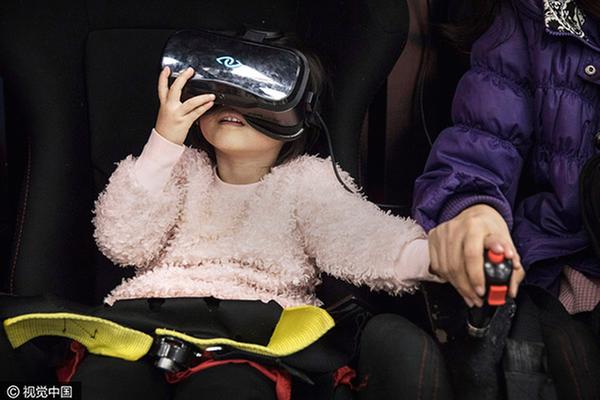Chinese rush to use VR and AR for their purchases
By Fan Feifei | China Daily | Updated: 2017-06-07 08:04
 |
| A Chinese girl wears virtual reality glasses (VR) as she sits on a roller coaster simulator at the Wantong VR Park, which claims to be China's largest in Beijing, November 27, 2016. [Photo/VCG] |
Chinese consumers are leading the world in using rapidly expanding virtual reality and augmented reality tech functions on their smartphones and other devices when buying products, according to a report issued by Worldpay, a London-headquartered payments company with global reach.
The report said 95 percent of Chinese respondents said they had used VR or AR technology in the past three months, which was more than three times the rate of VR use internationally.
It found that nearly all Chinese consumers were willing to make a purchase in a virtual environment, while 36 percent said security was a primary concern. Some 84 percent of those surveyed believed that VR or AR technology was the key future trend for shopping and only 1 percent of consumers would never make a purchase in a virtual environment.
Moreover, 49 percent of Chinese respondents said the products or shopping advices that are shown in a virtual environment would stimulate their impulse to buy products. The report found that 92 percent of consumers would like to see more retail apps make use of VR or AR.
The company which released the report processes payments across 146 countries and regions and cover 126 currencies. To make its findings, its survey queried more than 16,000 consumers across eight markets.
"Chinese consumers not only use this technology in video games and entertainment, but also drive the application of VR or AR in new fields, such as shopping," said Worldpay China General Manager Tang Kok San.
Tang said Chinese consumers were spearheading the next generation of shopping experiences and were eager to integrate more VR or AR technology into their shopping.
The report said 96 percent of respondents were interested in using VR or AR technology to improve how they shop and 78 percent thought using a VR device was a fun way of shopping online.
Although there were some security concerns when it comes to shopping with VR technology, 60 percent of Chinese respondents said they thought their payment information was safe in a virtual reality environment.
"The merchants who are looking forward to standing out in China's vibrant retail market should study how to integrate AR or VR technology into their customer experiences, as an immersive VR experience may have the capability to increase sales," Tang said.
He added that he was bullish on the application of VR technology in the shopping experience, emphasizing it was vital to make the payment process both smooth and secure for customers.
According to industry consultancy iResearch Consulting Group, China's VR market revenues will soar from 5.66 billion yuan ($825.3 million) in the current year to 55 billion yuan by 2020.
























